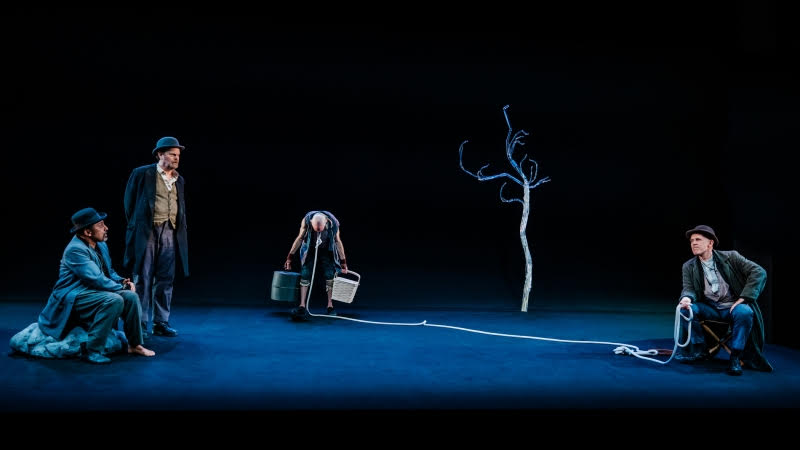‘Waiting for Godot’ offers unnervingly strong interpretation of classic play
(From left to right) Vladimir (Rainn Wilson) and Estragon (Aasif Mandvi) sit on a rock and look contemplatively into the distance. Samuel Beckett’s “Waiting for Godot” will show until Dec. 15. at the Geffen Playhouse. (Courtesy of Jeff Lorch)
“Waiting for Godot”
November 6 - December 15
Gil Cates Theater
$57 - $159





By Victoria Munck
Nov. 17, 2024 11:57 a.m.
This post was updated Dec. 1 at 9:52 p.m.
“Waiting for Godot” gives exactly what it promises, for better or worse.
Famously described as “a play in which nothing happens,” Samuel Beckett’s 1952 tragicomedy will sit at the Geffen Playhouse’s Gil Cates Theater until Dec. 15. The two and a half hour show presents conversations between Vladimir (Rainn Wilson) and Estragon (Aasif Mandvi), two men with an unspecified relationship, as they wait to meet the enigmatic Godot – for an unspecified reason. The classic’s weighty and rhythmic script demands focused, unfaltering performances, which its star-studded cast executes with brilliance. Thematically, however, the story’s ambiguity can take a toll on viewers. With so much left to the imagination, “Waiting for Godot” could either ignite a burst of intellectualism or lull its audience to sleep in the same breath.
[Related: Theater review: ‘Back to the Future: The Musical’ makes the future of theater feel bleak]
Scenic designer Kaye Voyce perfectly sets the stage for the perplexing story – in the sense that she does not design much of a set at all. In alignment with most productions of the play, the wide stage hosts a slender, leafless tree on the right and a medium-sized rock on the left – nothing more. The floor and backdrop share the same solid shade of gray, not even alluding to an identifiable climate or landscape. Tied together with cool lighting, the bleak visuals lead viewers into an appropriate state of boredom, as they too wait for Godot. The actors in turn become the most intriguing parts of the scene, ensuring they get undivided attention in a vastly performance-based show.
For many, Wilson might be the main draw of the production, as his Emmy-nominated portrayal of Dwight Schrute on NBC’s “The Office” remains one of the most fully realized performances in television history. His comedic prowess is just as evident in the role of Vladimir, which he embodies with wittily paced line delivery and bold physicality. Beyond the humor, Wilson’s extensive theater background comes to the forefront when Vladimir’s waiting devolves into existential desperation, silencing the room with his commanding pleas to be remembered at the end of each act.
Opposite Wilson is the equally captivating Mandvi, who similarly boasts an impressive slate of credits, including a decade-long correspondence on “The Daily Show.” Estragon’s emotions seem to fluctuate more than his counterpart, and Mandvi navigates the script’s various tone shifts with ease. His and Wilson’s performances are not only strong but also strenuous, as the actors remain on stage for the majority of the play’s lengthy duration. The pair’s ability to continuously give life to their characters in a show that could so easily disengage a performer is truly remarkable – a feat that ultimately qualifies the production as a success.

The introductions of supporting characters Pozzo (Conor Lovett) and Lucky (Adam Stein) also revitalize the play when the primary duo’s exchanges start to feel long winded. Lovett recites his lines at an oddly enchanting tempo, whereas Stein captures audiences with the precise control of his body tension, as Lucky is a largely silent figure. Ultimately, though, the reveal of the characters’ master-servant relationship is the first major indication of the play’s thematic complexity. Pozzo’s abusive treatment of Lucky – which is sometimes played for laughs – allows discomfort to permeate the theater while also raising questions of what this story is really about.
And the answer is never made clear, which is simultaneously a blessing and a curse. As the second act unfolds, not much changes, yet the sense of impatience and hopelessness feels more palpable than ever. There is so little to think about on stage that viewers are allotted time to translate their emotions into countless different theses – “Waiting for Godot” could be about the futility of life, the illusion of time or the loneliness of the human condition. Wilson and Mandvi channel so much depth within their performances while also refusing to present anything in a singular, clear-cut way, which beautifully keeps this ambiguity intact.
The problem is that, in order to create this open-endedness, the play must be unnervingly empty. There is no real plot amid a sea of inconsequential dialogue, and, most importantly, there is no Godot. The price for a viewer’s potential philosophical epiphany is a mostly exhausting theater experience without a rewarding resolution. For some, that is an acceptable trade. For many, that is a somewhat miserable night.
[Related: Theater review: ‘Dragon Lady’ lights up stage with expressive multi-generational tale]
Ultimately, Beckett’s work still feels as innovative today as it first did decades ago, turning the traditional structures of drama inside out. The Geffen Playhouse’s 2024-2025 season has continuously delivered cutting-edge productions that follow attendees beyond the theater, and “Waiting for Godot” is no exception. In this case, it is up to the viewer if the experience is worth the wait.
While much remains uncertain, “Waiting for Godot” guarantees formidable performances and a whirlwind of thought.
